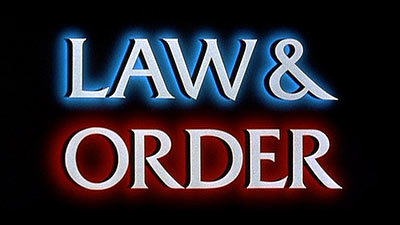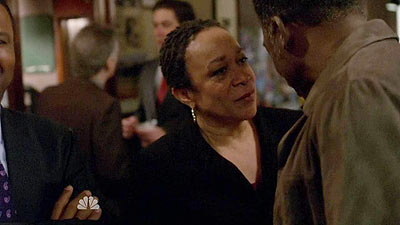Law & Order: These Are Our Stories
Published on May 30th, 2010 in: Editorial, TV |An elderly Jewish man is trying to convince police that he helped his ailing wife commit suicide out of love, but what is the real truth? Is he a devoted husband and Holocaust survivor, or Jacob Schulman, a former Nazi death camp officer trying to cover his tracks?

Screencap by megacaps
In 1996, I turned on my TV, randomly flipped to a channel, and became instantly riveted to the screen by the story just described. Eric Bogosian, who had completely blown my mind in Talk Radio a few years earlier, was portraying an attorney defending the fictional defendant, David Steinmetz, in a New York courtroom. This is how I discovered Law & Order. The episode was called “Night and Fog.”
At this point in time, the show had been on the air for almost three full seasons, but this was the first I’d heard of or seen it. Immediately, I became a dedicated viewer, watching reruns on A&E and new episodes on NBC.
For the next fifteen years, Law & Order became the only show I consistently watched, no matter when it was on, what channel, or even if I had seen the episode ten times already.
What made Law & Order so special and important was that it wasn’t a cop show or a lawyer show; it was both. Yet it didn’t try to be edgy like NYPD Blue or a soap opera like L.A. Law. Although it showed a case from the beginning, we didn’t always get a satisfying ending, or in some cases any ending at all.
It would be impossible to pick a favorite season or a favorite “team.” Each had their strengths and weaknesses. I’ve got a fondness for Detective Mike Logan and Captain Kragen, since they were cast members when I first started watching, but Lieutenant Anita Van Buren was such a no-nonsense woman, I quickly grew to love her. When Detective Lenny Briscoe left the show and actor Jerry Orbach succumbed to prostate cancer, the loss was definitely felt.
As for the lawyers, the permanently curmudgeonly D.A. Adam Schiff remains one of my favorite characters on any show. I also liked the feisty females like Abbie Carmichael and Jamie Ross. The first three seasons with Michael Moriarty as A.D.A. Ben Stone were amazing ones, and I’ll admit, it took me a little while to warm up to Sam Waterston as Jack McCoy, But Season 5’s “White Rabbit,” when McCoy reveals his past affiliations with 1960s student activism, won me over.
This was another reason why I loved the show. Although some might claim that Law & Order’s “ripped from the headlines” tagline was just shtick they tossed in to ameliorate sagging ratings, it’s been that way from the beginning, including the second episode, “Subterranean Homeboy Blues,” which was based on the Bernhard Goetz case.
In this way, the characters on Law & Order were not just the members of the cast, but the victims and criminals themselves. The episode based on the Karla Homolka case—Season 10’s “Fools For Love”—has haunted me to this day; I am unable to imagine actress Ellen Pompeo as anything but a sadistic murderer.

Season 20, Episode 23: “Rubber Room”
Screencap by dj43
Other NBC shows have tried to toe the line between character interaction and workplace-based drama with both good results (the first few seasons of E.R.) and bad (subsequent seasons of E.R.). The back-stories of the central characters on Law & Order—the cops and lawyers—never out shadowed the storylines, something that spinoffs Special Victims Unit and Criminal Intent were unable to repeat successfully. Not revealing too much kept us interested and intrigued, but never bored, especially when personal and professional lives sometimes became entangled.
This dynamic was something that even pop culture phenomena like LOST were never able to maneuver with complete success. There has been much debate over whether or not the recent LOST series finale was a triumph or a failure, and it all boils down to what you thought the show was about: the island or the characters. Law & Order never seemed to have this problem.
It wasn’t a perfect show by any means. Seasons 11 through 16 stumbled horribly, but things improved in Season 17. The show seemed to be as well-acted, well-written, and relevant as ever, which is why NBC’s seemingly sudden decision to cancel it at the end of Season 20 was so disheartening. They produced 20 seasons but they couldn’t even give Law & Order a proper ending? (ABC gave LOST two-and-a-half hours.) Although by now, NBC’s history with this sort of thing, i.e., Freaks & Geeks, SouthLAnd, Conan vs. Leno, is pretty well-documented, so I suppose I shouldn’t be surprised.
Whatever the case, I guess in the end, we’ll always have Law & Order—literally—since the show is syndicated everywhere and the DVDs are readily available. I still quote lines from certain episodes in my daily life, and I love trying to see how fast I can recall the plot of an episode before the opening theme starts.
Ah, the Law & Order theme. I prefer the first version, but either way, it’s as an iconic part of pop’s metaculture as the “chung CHUNG” noise between scenes. Even dogs are not immune from the spell Law & Order has cast.
Recently, rumors have circulated that the ignominious series finale may not be a death sentence for the show, with speculation about more episodes or at least a movie to tie up the loose ends.
Still, never again feeling the thrill of anticipating a new Law & Order episode has left an empty, gavel-shaped hole in my heart.
Less Lee Moore, Managing Editor
Time limit is exhausted. Please reload the CAPTCHA.